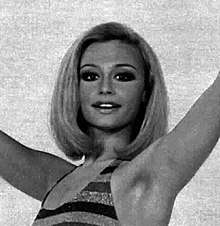Raffaella Carrà
| Raffaella Carrà | |
|---|---|
 Carrà in 1974 | |
| Born |
Raffaella Maria Pelloni 18 June 1943 Bologna, Emilia-Romagna, Italy |
Raffaella Maria Pelloni, better known as Raffaella Carrà (Italian: [raffaˈɛlla karˈra], born 18 June 1943, Bologna) is an Italian singer, dancer, television presenter, and actress. She is a popular figure in Europe and Latin America, both as a result of her many well-known taped presentations and records, and because of her many popular TV shows. Carrà is widely regarded as a gay icon.[1][2]
Early life
She was born in Bologna,[3] and took dance lessons there early on. When she was 8 years old, she left Bologna to study at the National Dance Academy (Accademia Nazionale di Danza) in Rome, and started her film career in the 1950s, playing the character of Graziella in Tormento del passato (1952), where she appears credited with her real name.
Career
Actress

Carrà debuted in cinema at age nine, in Tormento del passato (1952). She did five other movies until 1960 when she graduated from the national film school of Italy. The same year she appeared in Long Night in 1943, and went on to appear in many Italian peplum films, including Fury of the Pagans (1960), Atlas in the Land of the Cyclops (1961), Mole Men Against the Son of Hercules (1961), Ulysses Against the Son of Hercules (1962), Pontius Pilate (1962) and Caesar the Conqueror (1962), as well as comedies and action films such as 5 marines per 100 ragazze (1961), The Terrorist (1963), The Organizer (1963) and La Celestina P... R... (1965).
In 1965, she moved to the United States signing with 20th Century Fox. As Carrà, she starred in the motion picture Von Ryan's Express (1965) with Frank Sinatra, Edward Mulhare, and Trevor Howard. In 1966, she guest starred in an episode of the American television series I Spy (Sophia, as the title character). Feeling homesick, she decided to return to Italy where she starred in several Italian and French films such as Le Saint prend l'affût (1966), the Our Man Flint parody Il vostro super agente Flit (1966), Why Did I Ever Say Yes Twice? (1969) and Cran d'arrêt (1970), as well as a few television shows. However, subsequently her acting career has been scarce with no more than five works mainly for television.
Singing and dancing
Since 1961, Carrà has sung and danced on the variety shows of Italian television. In particular, since the early 1970s, they have contained elaborate choreography, mesmerizing elaborate themes, and her uninhibited style. She was the first television personality to show her belly button on camera. This was met with heavy criticism from the Vatican and Catholic churches in the countries that watched her show, Canzonissima.[4]
Carrà had a hit song with the sensual "Tuca Tuca" (1970), written for her singing and dancing television presentations by her long-time collaborator and former boyfriend, Gianni Boncompagni. Similarly, in 1971 Carrà achieved another hit with "Chissà se va". In 70s, Carrà dedicated a song to Satan, defined "magic divinity...soul without pity"[5].
Her greatest international hit single was "Tanti Auguri" ("Best Wishes"), which has become a popular song with gay audiences. The song is also known under its Spanish title "Para hacer bien el amor hay que venir al sur" (which refers to Southern Europe, since the hit was recorded and taped in Spain). The Estonian version of the song "Jätke võtmed väljapoole" was performed by Anne Veski. "A far l'amore comincia tu" ("To make love, your move first") was another success for her internationally, known in Spanish as "En el amor todo es empezar", in German as "Liebelei", in French as "Puisque tu l'aimes dis le lui", and in English as "Do It, Do It Again". It was her only entry to the UK Singles Chart, reaching number 9, where she remains a one-hit wonder.[6] In 1977, she recorded another hit single, "Fiesta" ("Party") originally in Spanish, but then recorded it in French and Italian after the song hit the charts.

In 1985, Carrà's Starlight Express video was released featuring characters, costumes and sets from the show. "A far l'amore comincia tu" has also been covered in Turkish by a Turkish popstar Ajda Pekkan as "Sakın Ha" in 1977. Recently, Carrà has gained new attention for her appearance as the female dancing soloist in a 1974 TV performance of the proto-rap funk gibberish song "Prisencolinensinainciusol" (1973) by Adriano Celentano. A remixed video containing her dancing went viral on the internet in 2008. In 2008 a video of a performance of her only UK hit single, 'Do It, Do It Again', appeared in the Doctor Who episode Midnight. Rafaella Carrà worked with Bob Sinclar on the new single "Far l'Amore" which was released on YouTube on 17 March 2011. The song charted in different European countries.
Spanish-language market
After her boom in the Italian market of the early 1970s, Carrà moved to Spain, doing television and releasing records in the Spanish language. This led her to move to South America, where her records had been heard for some years. In 1979, she established her headquarters in Buenos Aires, which was under a military dictatorship. Carrà was one of the figures of the ATC, the official television network of Argentina.
She was well received throughout Latin America, and filled the stadiums and theaters wherever she performed. In 1980, she filmed the Barbara musical romantic comedy, also in Buenos Aires, with the most important stars of the region. After appearing in the Festival de Viña del Mar (1982) she returned permanently to Italy. She visited the city of Salto, Uruguay and performed a show in the Parque Harriague.
References
- ↑ Meccia, Ernesto (14 June 2013). "Con Raffaella todo es empezar". Página/12 (in Spanish). Retrieved 2 August 2018.
- ↑ Pacho, Lorena (19 June 2018). "Raffaella Carrà, el mito cumple 75 años". El País (in Spanish). Retrieved 2 August 2018.
- ↑ Profile Archived 27 September 2007 at the Wayback Machine., Stradanove.net; accessed 13 October 2017.
- ↑ "Raffaella Carra - Italian Music"; retrieved 23 June 2015
- ↑ R. Carrà. Satan. Retrieved Sep 21, 2018. at minute 1:20
- ↑ Roberts, David (2006). British Hit Singles & Albums (19th ed.). London: Guinness World Records Limited. p. 95. ISBN 1-904994-10-5.
External links
- Raffaella Carrà at the Internet Movie Database
- Raffaella Carrà at the MSN